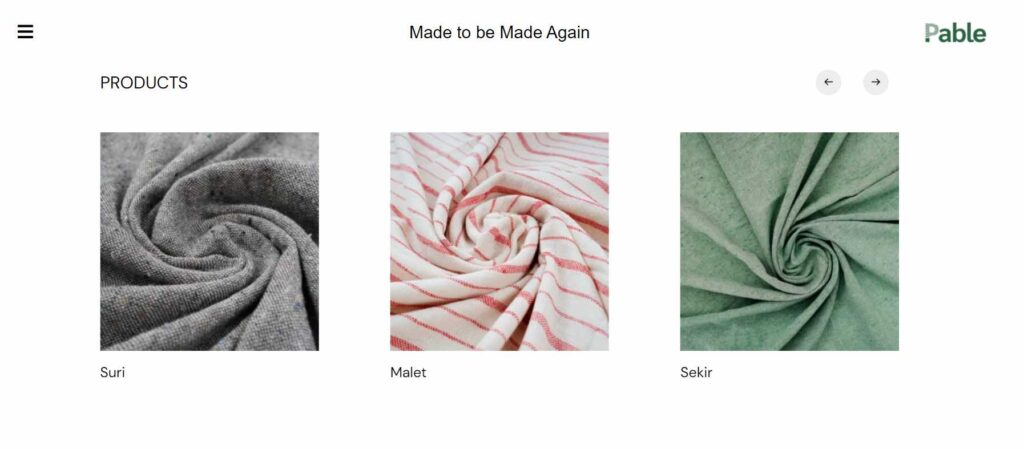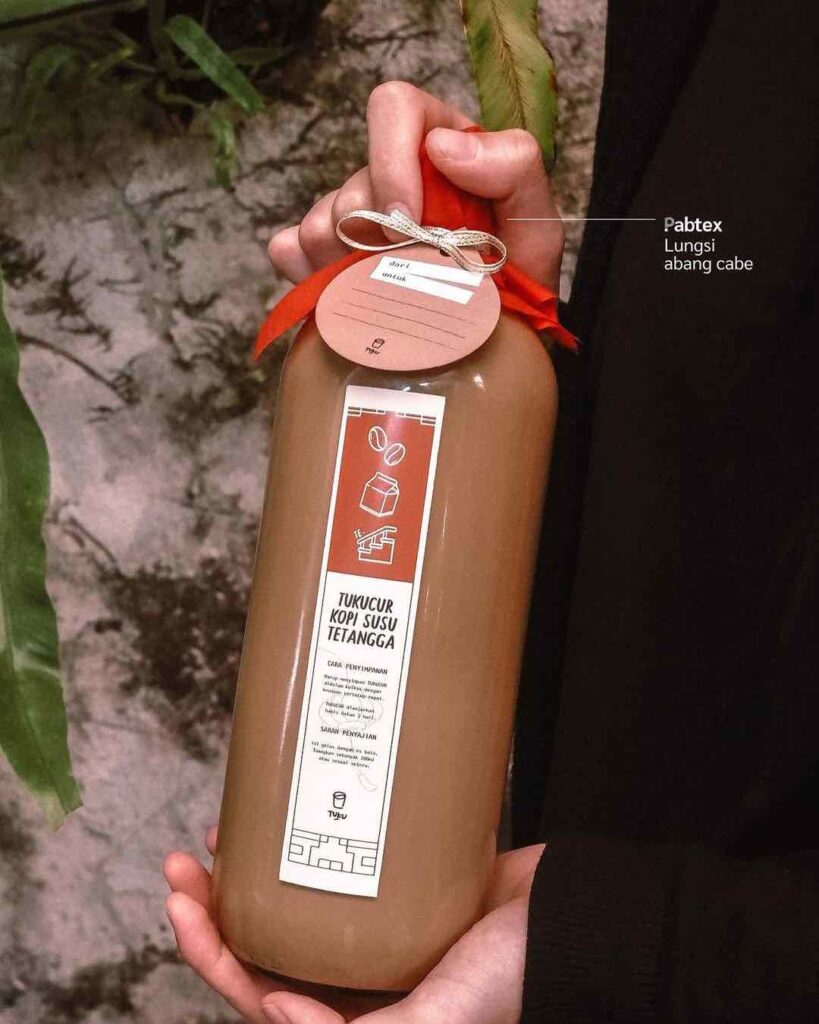Pable Indonesia is changing the way you look at recycled materials.
Today, Pable Indonesia stands tall as a resolute agent of change, steadfastly collaborating with these empowered communities, hand in hand, towards a future defined by sustainability and collective well-being. The journey has just begun, but the ripple effect is already palpable. With each strand of fabric recycled, Pable Indonesia weaves a tapestry of transformation.
RELEVANT SUSTAINABLE GOALS



From Waste to Wardrobe: The Origin Story of Pable Indonesia
Picture this: a bustling textile warehouse in 2016-2017, where heaps of discarded fabrics loom ominously overhead. Amidst this overwhelming spectacle, co-founder Aryenda Atma (36) found herself pondering a series of piercing questions: “Why is this waste piling up? Where did it all come from? What fate awaits these abandoned threads? And how are they dealt with?” Dissatisfaction surged through her veins as she received an unsatisfactory response: this textile waste was slated for an easy, albeit devastating fate—burned to ashes, all in the name of cost-cutting convenience.
The following years, 2018-2019, witnessed Aryenda’s relentless pursuit of knowledge about the handling of textile waste in Indonesia. Alas, her efforts yielded nothing but disheartenment. The landscape appeared devoid of any tangible regulations for managing domestic waste, while fashion brands conveniently swept their textile waste management practices under the rug. Even uniform waste, an often overlooked villain, contributed substantially to the predicament. Aryenda felt the urgency of instigating change surge through her veins.
And so, in the year 2020, Aryenda made a momentous decision—she bid farewell to her conventional career and birthed Pable Indonesia into existence. But let’s not mistake this as a hasty leap into the unknown. The foundations for this endeavor had been carefully laid throughout 2019, as Aryenda meticulously prepared and fashioned the blueprint for her brainchild. From January to September 2020, Pable Indonesia embarked on an ardent quest, seeking out partners who shared their vision of empowerment. Their mission? To spearhead the establishment of facilities that would breathe new life into textile waste, while directly uplifting communities in need.
From the same garment factory, it can produce 80-100 tons of textile waste. The textile waste always ends up being burned because it is considered to be the cheapest solution and doesn’t require a lot of knowledge.
Aryenda Atma, CEO & Founder of Pable Indonesia.
Reviving Tradition and Redefining Waste: Pable Indonesia’s Bold Partnership and Innovative Programs
Indonesia, a land brimming with untapped potential, holds a special place in the heart of Pable Indonesia—a trailblazing textile recycling company causing ripples in the fashion industry. Recognizing the country’s capacity for sustainable textile production, Pable Indonesia forged an inspiring partnership with the enchanting Karangrejo village in Pasuruan, East Java, Indonesia. Once celebrated as the region’s weaving epicenter, the village witnessed the gradual fading of its vibrant textile industry in the face of evolving trends and emerging sectors. Today, only a few resilient elders, around 80 years old, remain steadfast in their weaving craft. Committed to breathing life back into this traditional village and its time-honored techniques, Pable Indonesia birthed the groundbreaking Pabmove program.
Pabmove, a visionary initiative, spearheads the implementation of a circular lifestyle concept in Indonesia through circular textiles. This innovative program ingeniously transforms textile waste into novel materials, thereby fostering a sustainable and circular supply chain. Armed with a solution that metamorphoses textile waste into fabric, Pable Indonesia ardently believes in the potential of circular textiles—elegantly integrating reasonable, simple, and 100% utilization of textile waste.
We want to recycle to the point where we don’t have any material to recycle. Meaning, that industries engaged in fashion are more responsible and people, as consumers, are also starting to change their lifestyle.
Aryenda Atma, CEO & Founder of Pable Indonesia.
Through their collaboration with the Karangrejo village, Pable Indonesia extends critical resources and training in textile recycling, paving the way for job opportunities within the community while simultaneously curbing textile waste in Indonesia. With unwavering conviction, Pable Indonesia envisions a future where collaboration with local communities can revolutionize the textile industry, fostering sustainability and circularity.
In a bid to promote a recoverable lifestyle grounded in sustainability, Pable Indonesia has also embarked on a restorative economic scheme, championing the transformative power of textile waste. A community-driven organization at its core, Pable Indonesia radiates inclusivity and welcomes others to join their noble cause. Be sure to check out the Pabtex catalogue to see the incredible potential of this material.
Pable Indonesia’s growth and unwavering commitment to circularity
In the thrilling month of March 2023, Pable Indonesia unveiled a game-changing collaboration with Indosole Indonesia—a curated collection of stylish and comfortable sandals. What sets these sandals apart is their unconventional composition: a marriage of tire waste and textile waste. By harnessing these materials, Pable Indonesia and Indosole Indonesia triumphantly contribute to waste reduction while crafting exquisite, eco-friendly products. So, be sure to explore this remarkable collection and be part of the movement steering us towards a more sustainable future.
But Pable Indonesia’s tireless efforts do not stop there. Now, they’ve joined forces with Kopi Tuku to tackle the mammoth issue of clothing waste head-on. Introducing “Dropbox,” a revolutionary program designed to sort, process, and harness clothing waste for renewable materials. Thanks to the strategic partnership with Kopi Tuku, Dropbox bins will grace multiple locations across Jakarta, Serpong, Bandung, and Surabaya. This dynamic collaboration opens doors for more individuals to actively participate in clothing recycling and play their part in building a greener, more sustainable tomorrow. Make sure to explore the Pabtex catalog, showcasing the awe-inspiring potential of this remarkable material.
Pable Indonesia’s indomitable spirit and visionary partnerships serve as a clarion call to all who seek a world where tradition is preserved, waste is transformed, and sustainability reigns supreme. Join their cause, witness the magic unfold, and let us march towards a future that truly embraces the power of circularity.
Pable Indonesia’s Game-Changing Uniform Disposal Program: Transforming Waste into Sustainability
When the glitz and glamour of events fade away, what remains is often an overlooked problem: uniform waste. But Pable Indonesia refuses to let this issue go unnoticed. With their innovative uniform disposal program, they are taking a stand against the mounting piles of discarded uniforms that accumulate after every event or design change. This bold initiative exemplifies Pable Indonesia’s unwavering commitment to Environmental, Social, and Governance (ESG) practices, while also playing a crucial role in mitigating the climate crisis. By implementing a uniform recycling process, Pable Indonesia aligns with the 12th Sustainable Development Goal (SDG) of Responsible Production & Consumption, driving sustainable practices to the forefront.
Pable Indonesia’s determination to make recycled materials the new norm is palpable. In their quest for a more sustainable future, they have forged strategic partnerships with renowned names in the industry. Collaborating with Faithfull The Brand from Australia, Cargill from America, Rimba Makmur Utama forest conservation in Kalimantan, and Bank Central Asia (BCA Bank) from Indonesia, Pable Indonesia is reshaping the business landscape. Through these transformative alliances, Pable Indonesia strives to develop a business model that promotes a restorative economic scheme and fosters inclusive communities.
Recycled materials or environmentally friendly materials are not expensive. What makes these materials expensive is the long processing process.
Aryenda Atma, CEO & Founder of Pable Indonesia.
You may also be interested in :
Trashion : Uncovering The Dire Consequences of Exporting Plastic Clothes Waste To The Global South




